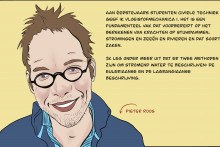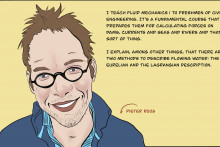You may be familiar with so-called ‘life hacks’, simple tricks that differentiate exceptional people from average. Know them and your life will never be the same again. For example, you can give the best high-fives by looking at someone’s elbow, and seatbelts in cars are perfect beer openers (you didn’t get that from me!). On a more serious note, here are seven study life hacks that may or may not work to improve your grades. Each of them is given a rating by Pieter Roos.
Only a few students have mastered this technique, which is the most time-efficient way to pass your study. For some reason 99% of the exams only test if you have a short-term memory or not. You would think that after proving this once, they can just hand you your degree. Although, of
Students who truly play 4D chess, do not settle for a dusty old book. No, they study by watching YouTube videos, because why read an entire book 
I always feel a bit sorry for the teacher when all the back rows are filled to the brim and there’s a big empty gap in front. Although, sometimes 
Do you know that feeling when you have a question, explain it to someone, and suddenly you know the answer? It also works for studying. Well, 
If you discover the answer, please contact me, as I still have no clue.

Truly advanced students don’t even go to the lecture and watch the recording at home at 2-4x speed. That leaves you more time for actual whatever gets you out of bed in the morning.
Some students take this literally and add gummy bears or other candy all over their book, to ‘reward’ themselves. As Trump would say: “Sounds 

Teacher’s perspective: Dr. ir. Pieter Roos
'If I go to a parent-teacher conference and my wife comes along, I pay less attention simply because I know that my wife is already paying attention. This is comparable to recording a lecture or relying too much on technology – like making notes on your tablet – so I would not recommend that.
To continue the imaginary analogies: imagine, if you will, that you can either drive a new, sporty Volvo, or an old car. Would you drive as fast with the old car? No, your risk acceptance differs. This is similar to relying on technology and other methods for studying. There is a danger that you become too dependent on it. I support the old-school pen-and-paper method.
I think teaching others is the most useful method here. It also helps if you can empathize with the professor and grasp why he or she finds the subject interesting (or ask!). Learning by chunking can work, but I would recommend also drawing sufficient connections and parallels between the chunks. It would be a mistake to ignore the bigger picture.'








